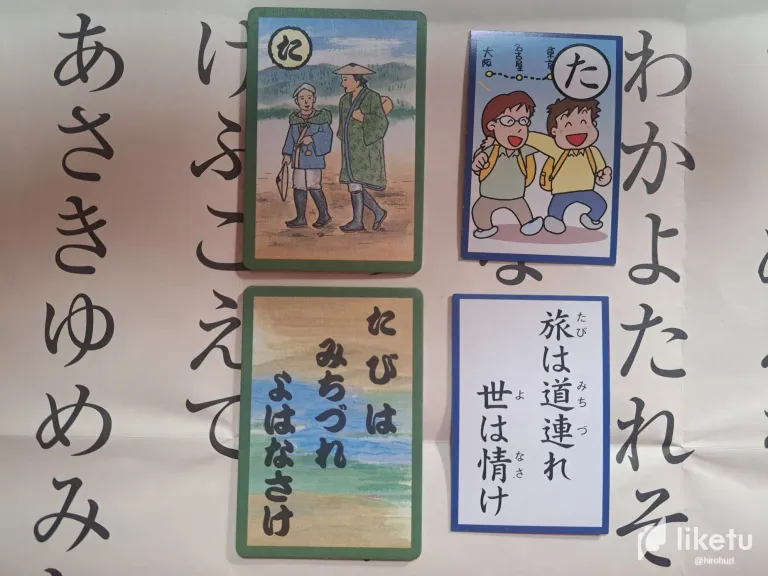
Both my Japanese Iroha Karuta decks agree that the best proverb to illustrate the 16th syllable, "Ta" (た), is all about the benefit of companionship on a journey, or "Tabi" (hiragana: たび = kanji: 旅):
"旅は道連れ世は情け"
Tabi wa michizure yo wa nasake.
- 旅 = tabi = journey
- は = wa = topic marker ("With regard to" ...)
- 道連れ = michitzure = companion
- 世 = yo = world, this life
- は = topic marker ("Regarding"...)
- 情け = Nasake = sympathy, kindness, sentiment
So a plain and direct translation would go something like this:
With regard to travel, companionship; with regard to this life, kindness...
Parallelism
You may notice that the proverb is divided into two parts that run parallel to each other like this:
Tabi wa michizure, (As for travel, companionship,)
yo wa nasake. (As for life, kindness.)
We might say that just a kind companion makes a long journey easier, so too does the exercise of kindness on our earthly pilgrimage.
Here is how the booklet that comes with the green set puts it:
旅行には道連れがあった方が楽しく、お互いに助け合いができる。
世渡りも人情を持てつき合うのが大切である。
Ryokou ni wa michitzureba atta kata ga tanoshiku wo otagai ni tasukeai ga dekiru.
Yotowari mo ninjou wo mottetsukiau no ga taisetsu de aru.
When travelling, it is more enjoyable to have companions who can help each other.
In life, it is important to navigate the world with empathy and to engage with others sincerely.
My Translation
I want to emphasize both the structure and the compression that the Japanese proverb conveys, so I came up with this final translation:
Travel with companions,
Live with kindness.
Firstly, I tried to echo the "melopoeia" of the original:
- TaBi - TraVel
- Wa - with
- michiTZure - companionZ (just one syllable less than the original)
- yo - live (1 syllable)
- Wa - with
- NaSaKe - KiNdNeSS (just one syllable less than the original)
Secondly, I have managed to echo the parallel structure of the original by using just six words, with "with" in the middle of each line.
Putting the Challenge to ChatGPT
Let's see what our AI pal can come up with...
The Japanese proverb "旅は道連れ世は情け" can be translated into English as:
"Travel is more enjoyable with companions; life is about human kindness."
Not bad. It offers a clear translation of the original into natural English.
Okay, now let's try Google Translate...
The journey is a journey, the life is a mercy
OH DEAR! ChatGPT wins again!
What about you... Do you like to travel with companions or do you prefer to travel alone? Whichever, the important thing is to travel through life with kindness and consideration - not that I have always done so!
Cheers!
David Hurley
#InspiredFocus
For the best experience view this post on Liketu